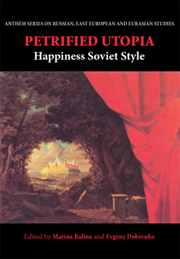Introduction
Published online by Cambridge University Press: 05 March 2012
Summary
In his new book Happiness: A History, Darrin McMahon refers to the observation made by Hegel: ‘One may contemplate history from the point of view of happiness, but history is not the soil in which happiness grows. The periods of happiness in it are the blank pages of history.’ But what are the ‘periods of happiness’ in history, and were there, in fact, such periods in history (even if we allow them to be ‘blank pages’)? Obviously, the yearning for happiness is one of mankind's fundamental needs, and its fulfilment is the basis for a person's creative activity, filling the sphere of his/her imagination. The yearning for happiness is a quite individual need, and this is why drama arises from the historical impossibility of harmonising individual happiness with the overall social project. Without doubt, the Soviet era attempted to achieve just this harmony. It was, however, an era of shortages everywhere. The only thing that it provided in abundance was the historical cataclysms that followed hard upon each other, any one of which might well comprise an entire era in the history of a nation. The Russian revolution was an attempt to fast-forward history. Today, what it produced-the Soviet era-has itself become history.
Marxism, which the Russian revolutionaries invoked, was least of all concerned with the private (or bourgeois) ideal of happiness.
- Type
- Chapter
- Information
- Petrified UtopiaHappiness Soviet Style, pp. xv - xxivPublisher: Anthem PressPrint publication year: 2009
- 3
- Cited by

